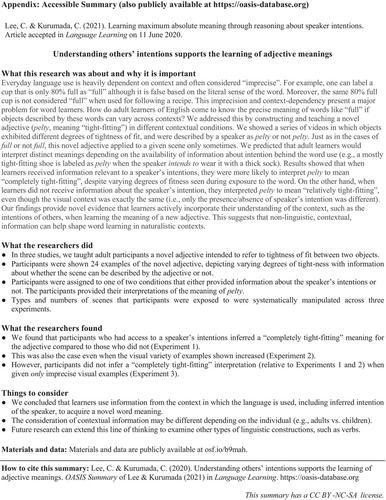当前位置:
X-MOL 学术
›
Lang. Learn.
›
论文详情
Our official English website, www.x-mol.net, welcomes your feedback! (Note: you will need to create a separate account there.)
Learning Maximum Absolute Meaning Through Reasoning About Speaker Intentions
Language Learning ( IF 5.240 ) Pub Date : 2020-11-04 , DOI: 10.1111/lang.12439 Crystal Lee 1 , Chigusa Kurumada 2
Language Learning ( IF 5.240 ) Pub Date : 2020-11-04 , DOI: 10.1111/lang.12439 Crystal Lee 1 , Chigusa Kurumada 2
Affiliation

|
Three experiments investigated adult learners’ acquisition of a novel adjective. In English and other languages, meanings of some gradable adjectives are said to include an absolute standard of comparison (e.g., full means completely filled with content). However, actual usage is often imprecise, where a maximum absolute standard of comparison, strictly speaking, does not apply (e.g., a 90% full cup can be full depending on how it will be used). This creates problems for learners who acquire the absolute meaning from variable mappings between word forms and observations. We demonstrated that adult learners infer a maximum standard of comparison when they receive information about agents’ intended goals that lie behind imprecise word usage. Results suggested these inferences are conditioned on the amount of visually ambiguous observations made during learning. We conclude that access to agents’ intended goals allows learners to explain contextual sources of imprecision and helps the learning of a maximum absolute meaning from primarily nonabsolute observations.
中文翻译:

通过推理说话者意图来学习最大绝对含义
三个实验调查了成年学习者对一个新颖形容词的习得情况。在英语和其他语言中,某些可分级形容词的含义据说包括绝对的比较标准(例如,完整的表示完全充满了内容)。然而,实际使用通常是不精确的,严格来说,严格的最高绝对比较标准并不适用(例如,满杯的杯子可以装满90%,具体取决于如何使用)。这给从单词形式和观察值之间的变量映射中获得绝对含义的学习者带来了问题。我们证明,成年学习者在收到有关不正确的单词用法背后的探员预期目标的信息时,会推断出最高的比较标准。结果表明,这些推论以学习过程中视觉上模糊的观察结果为条件。我们得出的结论是,访问代理的预期目标可以使学习者解释不精确的上下文来源,并有助于从主要是非绝对的观察中学习最大的绝对含义。
更新日期:2020-11-04
中文翻译:

通过推理说话者意图来学习最大绝对含义
三个实验调查了成年学习者对一个新颖形容词的习得情况。在英语和其他语言中,某些可分级形容词的含义据说包括绝对的比较标准(例如,完整的表示完全充满了内容)。然而,实际使用通常是不精确的,严格来说,严格的最高绝对比较标准并不适用(例如,满杯的杯子可以装满90%,具体取决于如何使用)。这给从单词形式和观察值之间的变量映射中获得绝对含义的学习者带来了问题。我们证明,成年学习者在收到有关不正确的单词用法背后的探员预期目标的信息时,会推断出最高的比较标准。结果表明,这些推论以学习过程中视觉上模糊的观察结果为条件。我们得出的结论是,访问代理的预期目标可以使学习者解释不精确的上下文来源,并有助于从主要是非绝对的观察中学习最大的绝对含义。


























 京公网安备 11010802027423号
京公网安备 11010802027423号